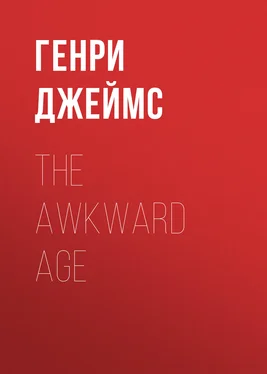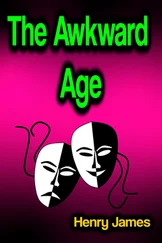Генри Джеймс - The Awkward Age
Здесь есть возможность читать онлайн «Генри Джеймс - The Awkward Age» — ознакомительный отрывок электронной книги совершенно бесплатно, а после прочтения отрывка купить полную версию. В некоторых случаях можно слушать аудио, скачать через торрент в формате fb2 и присутствует краткое содержание. Жанр: foreign_prose, foreign_antique, на английском языке. Описание произведения, (предисловие) а так же отзывы посетителей доступны на портале библиотеки ЛибКат.
- Название:The Awkward Age
- Автор:
- Жанр:
- Год:неизвестен
- ISBN:нет данных
- Рейтинг книги:5 / 5. Голосов: 1
-
Избранное:Добавить в избранное
- Отзывы:
-
Ваша оценка:
- 100
- 1
- 2
- 3
- 4
- 5
The Awkward Age: краткое содержание, описание и аннотация
Предлагаем к чтению аннотацию, описание, краткое содержание или предисловие (зависит от того, что написал сам автор книги «The Awkward Age»). Если вы не нашли необходимую информацию о книге — напишите в комментариях, мы постараемся отыскать её.
The Awkward Age — читать онлайн ознакомительный отрывок
Ниже представлен текст книги, разбитый по страницам. Система сохранения места последней прочитанной страницы, позволяет с удобством читать онлайн бесплатно книгу «The Awkward Age», без необходимости каждый раз заново искать на чём Вы остановились. Поставьте закладку, и сможете в любой момент перейти на страницу, на которой закончили чтение.
Интервал:
Закладка:
“What’s between any woman and the man she’s making up to?”
“Why there may often be nothing. I didn’t know she even particularly knew him,” Brookenham added.
“It’s exactly what she would like to prevent any one’s knowing, and her coming here to be with him when she knows I know SHE knows—don’t you see?—that he’s to be here, is just one of those calculations that ARE subtle enough to put off the scent a woman who has but half a nose.” Mrs. Brookenham as she spoke appeared to attest by the pretty star-gazing way she thrust it into the air her own possession of the totality of such a feature. “I don’t know yet quite what I think, but one wakes up to such things soon enough.”
“Do you suppose it’s her idea that he’ll marry her?” Brookenham asked in his colourless way.
“My dear Edward!” his wife murmured for all answer.
“But if she can see him in other places why should she want to see him here?” Edward persisted in a voice destitute of expression.
Mrs. Brookenham now had plenty of that. “Do you mean if she can see him in his own house?”
“No cream, please,” her husband said. “Hasn’t she a house too?”
“Yes, but so pervaded all over by Aggie and Miss Merriman.”
“Oh!” Brookenham commented.
“There has always been some man—I’ve always known there has. And now it’s Petherton,” said his companion.
“But where’s the attraction?”
“In HIM? Why lots of women could tell you. Petherton has had a career.”
“But I mean in old Jane.”
“Well, I dare say lots of men could tell you. She’s no older than any one else. She has also such great elements.”
“Oh I dare say she’s all right,” Brookenham returned as if his interest in the case had dropped. You might have felt you got a little nearer to him on guessing that in so peopled a circle satiety was never far from him.
“I mean for instance she has such a grand idea of duty. She thinks we’re nowhere!”
“Nowhere?”
“With our children—with our home life. She’s awfully down on Tishy.”
“Tishy?”—Edward appeared for a moment at a loss.
“Tishy Grendon—and her craze for Nanda.”
“Has she a craze for Nanda?”
“Surely I told you Nanda’s to be with her for Easter.”
“I believe you did,” he bethought himself, “but you didn’t say anything about a craze. And where’s Harold?” he went on.
“He’s at Brander. That is he will be by dinner. He has just gone.”
“And how does he get there?”
“Why by the South-Western. They’ll send to meet him.”
Brookenham appeared for a moment to view this statement in the dry light of experience. “They’ll only send if there are others too.”
“Of course then there’ll be others—lots. The more the better for Harold.”
This young man’s father was silent a little. “Perhaps—if they don’t play high.”
“Ah,” said his mother, “however Harold plays he has a way of winning.”
“He has a way too of being a hopeless ass. What I meant was how he comes there at all,” Edward explained.
“Why as any one comes—by being invited. She wrote to him—weeks ago.”
Brookenham just traceably took this in, but to what profit was not calculable. “To Harold? Very good-natured.” He had another short reflexion, after which he continued: “If they don’t send he’ll be in for five miles in a fly—and the man will see that he gets his money.”
“They WILL send—after her note.”
“Did it say so?”
Her melancholy eyes seemed, from afar, to run over the page. “I don’t remember—but it was so cordial.”
Again he meditated. “That often doesn’t prevent one’s being let in for ten shillings.”
There was more gloom in this forecast than his wife had desired to produce. “Well, my dear Edward, what do you want me to do? Whatever a young man does, it seems to me, he’s let in for ten shillings.”
“Ah but he needn’t be—that’s my point. I wasn’t at his age.”
Harold’s mother took up her book again. “Perhaps you weren’t the same success! I mean at such places.”
“Well, I didn’t borrow money to make me one—as I’ve a sharp idea our young scamp does.”
Mrs. Brookenham hesitated. “From whom do you mean—the Jews?”
He looked at her as if her vagueness might be assumed. “No. They, I take it, are not quite so cordial to him, since you call it so, as the old ladies. He gets it from Mitchy.”
“Oh!” said Mrs. Brookenham. “Are you very sure?” she then demanded.
He had got up and put his empty cup back on the tea-table, wandering afterwards a little about the room and looking out, as his wife had done half an hour before, at the dreary rain and the now duskier ugliness. He reverted in this attitude, with a complete unconsciousness of making for irritation, to an issue they might be supposed to have dropped. “He’ll have a lovely drive for his money!” His companion, however, said nothing and he presently came round again. “No, I’m not absolutely sure—of his having had it from Mitchy. If I were I should do something.”
“What would you do?” She put it as if she couldn’t possibly imagine.
“I’d speak to him.”
“To Harold?”
“No—that might just put it into his head.” Brookenham walked up and down a little with his hands in his pockets, after which, with a complete concealment of the steps of the transition, “Where are we dining to-night?” he brought out.
“Nowhere, thank heaven. We grace our own board.”
“Oh—with those fellows, as you said, and Jane?”
“That’s not for dinner. The Baggers and Mary Pinthorpe and—upon my word I forget.”
“You’ll see when she comes,” suggested Brookenham, who was again at the window.
“It isn’t a she—it’s two or three he’s, I think,” his wife replied with her indifferent anxiety. “But I don’t know what dinner it is,” she bethought herself; “it may be the one that’s after Easter. Then that one’s this one,” she added with her eyes once more on her book.
“Well, it’s a relief to dine at home”—and Brookenham faced about. “Would you mind finding out?” he asked with some abruptness.
“Do you mean who’s to dine?”
“No, that doesn’t matter. But whether Mitchy HAS come down.”
“I can only find out by asking him.”
“Oh I could ask him.” He seemed disappointed at his wife’s want of resource.
“And you don’t want to?”
He looked coldly, from before the fire, over the prettiness of her brown bent head. “It will be such a beastly bore if he admits it.”
“And you think poor I can make him not admit it?” She put the question as if it were really her own thought too, but they were a couple who could, even face to face and unlike the augurs behind the altar, think these things without laughing. “If he SHOULD admit it,” Mrs. Brookenham threw in, “will you give me the money?”
“The money?”
“To pay Mitchy back.”
She had now raised her eyes to her husband, but, turning away, he failed to meet them. “He’ll deny it.”
“Well, if they all deny it,” she presently remarked, “it’s a simple enough matter. I’m sure I don’t want them to come down on us! But that’s the advantage,” she almost prattled on, “of having so many such charming friends. They DON’T come down.”
This again was a remark of a sweep that there appeared to be nothing in Brookenham’s mind to match; so that, scarcely pausing in the walk he had resumed, he only said: “Who do you mean by ‘all’?”
“Why if he has had anything from Mitchy I dare say he has had something from Van.”
Читать дальшеИнтервал:
Закладка:
Похожие книги на «The Awkward Age»
Представляем Вашему вниманию похожие книги на «The Awkward Age» списком для выбора. Мы отобрали схожую по названию и смыслу литературу в надежде предоставить читателям больше вариантов отыскать новые, интересные, ещё непрочитанные произведения.
Обсуждение, отзывы о книге «The Awkward Age» и просто собственные мнения читателей. Оставьте ваши комментарии, напишите, что Вы думаете о произведении, его смысле или главных героях. Укажите что конкретно понравилось, а что нет, и почему Вы так считаете.












